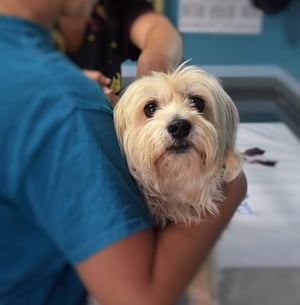Moving a Pet to the United States
Rules and Regulations for International Pet Shipping
What Pet Travel Documents Are Needed to Travel to the United States?
The US Department of Agriculture (USDA APHIS) and the Centers for Disease Control (CDC) both regulate cats, dogs, and other pets entering the country. However, many individual states also have specific rules you’ll need to follow. You can check the state rules here.
USDA/CDC rules depend on where your pet has been living in the last 6 months. If you don’t comply with these import requirements, there may be delays and headaches when your pet tries to enter the US.
Vaccinations
Dogs
If your dog has been in a rabies-free or rabies-controlled country for the last 6 months, then a rabies vaccination is not mandatory.
If your dog is coming from a high-risk rabies country, then they must have a valid rabies vaccination. The rabies vaccine must be given after a microchip is implanted/scanned and the dog must have been at least 12 weeks old at the time of vaccination. If it is a primary vaccination (very first or one given after a lapse), then the dog must wait at least 28 days before traveling to the US.
The following general vaccinations are not mandatory but are strongly recommended:
- DHPP (Distemper, Hepatitis, Parainfluenza, Parvovirus)
- Bordetella (Kennel Cough)
- CIV (Canine Influenza Virus)
- Leptospirosis
Cats
Cats are only required to have proof of rabies vaccination for specific states, but we strongly recommend you keep your cat vaccinated anyway. You can learn about state-specific regulations here.
The following general vaccinations are not mandatory but are strongly recommended:
- FVRCP (Feline Viral Rhinotracheitis, Calicivirus, Panleukopenia)
- Feline Leukemia (for outdoor cats)
Tapeworm Treatment (Dogs Only)
Dogs being used in livestock handling that are traveling from any country (except Canada, Mexico, and certain regions of Central America and the West Indies) must have no evidence of tapeworm infection. It is recommended that a veterinarian administers a tapeworm treatment prior to travel.
Foot and Mouth Disease (Dogs Only)
Dogs traveling from countries affected with foot and mouth disease need to meet the following requirements:
- Paws, fur, and bedding should be free of any dirt, hay, or straw.
- The pet should be bathed as soon as they arrive.
- The pet should be separated from any livestock for at least 5 days after arriving in the US.
- They should have no signs of a tapeworm infection.
Screwworm Inspection (Dogs Only)

If your dog is traveling from a country where screwworm is present, they will need a certificate verifying that they have been inspected for screwworm within 5 days prior to departure and that they: are free from screwworm OR were infested, but have since been quarantined and treated until free from screwworm prior to departure.
The certificate must be signed by a full-time, salaried veterinary official in the country of export.
Rabies Titer Test (Dogs Only)
Dogs coming from high-risk rabies countries will require a rabies titer blood test if the current rabies vaccination was administered outside the USA and you do not want your pet to be quarantined. The rabies titer test must meet the following criteria:
- The blood must be drawn at least 30 days after the primary rabies vaccination and at least 28 days prior to entry in the US.
- The blood sample must be sent to a CDC-approved rabies serology laboratory.
- The results must be >/= 0.5 IU/ml
- The Rabies titer results are valid for the life of the dog as long as the rabies vaccination coverage does not lapse.
If your dog does NOT have a valid rabies titer test then they will be required to be quarantined at a CDC-registered animal care facility for 28 days and revaccinated for rabies by the quarantine's veterinarian.
Dogs coming from rabies-free or low-risk countries are not required to have a Rabies Titer Test for travel to the United States.
Cats
Cats are not required to have a Rabies Titer Test for travel to the United States.
CDC Dog Import Form (Dogs Only)
Dogs entering the United States are required to have a CDC Dog Import Form receipt upon arrival.
-
This form should be filled out online 2-10 days before arrival. All information on the form must be correct at time of arrival.
- This form requires you to upload a clear photograph of your dog showing its face and body.
Health Certificates
Dogs
Dogs coming from rabies-free or rabies-controlled countries do not require an export health certificate, but they must appear healthy upon arrival. However, we strongly recommend a health certificate be completed within 10 days prior to travel as some exporting countries and airlines do require it.
Dogs coming to the United States from high-risk rabies countries who have a valid US rabies vaccination certificate do not require an export health certificate. However, as mentioned above, we still recommend having one.
Dogs who are coming from high-risk rabies countries and were vaccinated in another country will require the Certification of Foreign Rabies Vaccination and Microchip Form to be completed within 30 days prior to travel.
However, please note that many airlines require the health certificate to be issued within 10 days prior to travel.Cats
Although cats are generally not required to have an international health certificate for import to the US, they may be inspected for evidence of infectious disease at the port of entry. Many airlines and exporting countries will still require a health certificate for cats, usually within 10 days prior to travel. We strongly recommend you have a health certificate completed for your cat prior to travel.
Photo of Pet
Dogs
When filling out the CDC Dog Import form you will need to upload a clear photograph of your dog showing their face and body.
Cats
A photo of of cats is not required for entry to the US, but if you have a breed that may require the US Fish & Wildlife, then we will ask for a photo.
Example breeds include: Bengals, or others protected by CITES.
What Are the Pet Restrictions for the United States?
Age Restrictions for the United States
Dogs
All dogs must be at least 6 months old to enter the United States.
Cats
There is no restriction on a cat's age for traveling to the United States. However, many airlines and exporting countries have their own age restrictions for transporting kittens. In general, kittens should be at least 12 weeks old.
Banned Breeds
 The United States does not ban any breeds. However, restrictions on certain breeds may be present in some cities or housing areas. Please make sure you check with the local government before you move your pet.
The United States does not ban any breeds. However, restrictions on certain breeds may be present in some cities or housing areas. Please make sure you check with the local government before you move your pet.
Do I Need a Microchip for My Pet to Travel to the United States?
All dogs entering the United States are required to have an ISO-compatible microchip. For those coming from high-risk rabies countries, the microchip must be implanted prior to the most recent rabies vaccination.
While a microchip is not required for cats, it is strongly recommended. In some cases, exporting countries may require a microchip to leave the country.
What Are the Quarantine Requirements for a Pet Traveling to the United States?
Dogs
Dogs coming from high-risk rabies countries that have not completed a rabies titer test are required to be quarantined for 28 days at a CDC-registered animal care facility.
Cats
Cats are not required to be quarantined upon arrival unless they are traveling to Hawaii or Guam.
Hawaii
If your pet is traveling to Hawaii, they may qualify for Direct Airport Release. Otherwise, they will need to spend time in quarantine.
Guam
If your pet is traveling to Guam, then they will be required to spend time in quarantine. The length of quarantine will depend on which requirements your pet is following.
Are There Any Area Specific Pet Requirements in the United States?
You can contact find state-specific requirements here.
Our United States pet transport services include:
- Door-to-door transport
- Assistance with health certificates, import certificates, and other travel documents needed for pet travel to the United States
- USDA endorsement and (when needed)
- Airline-approved travel kennels provided with personalized labels, identification
and emergency notification instructions - Customs clearance and delivery to your home
- Travel consultation and flight reservations

